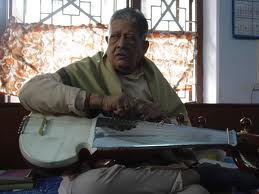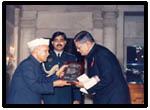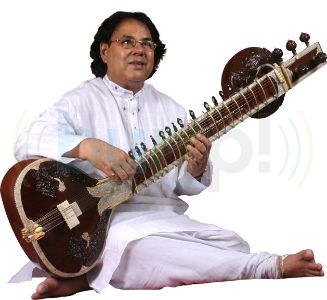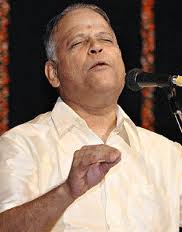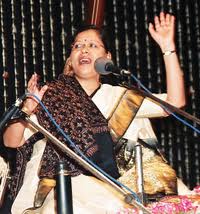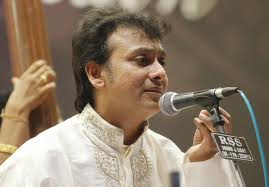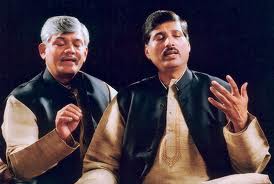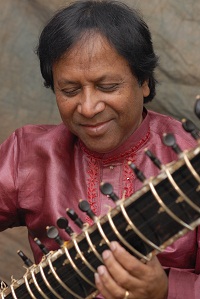Contribute
| An Indian Classical Music Extravaganza Coming To Boston In 5 Weeks! |
Shuchita Rao
02/16/2012
Spring will be arriving to Boston soon. Tiny crocus heads will break through the barren ground, green leaves will magically appear on bare trees, colorful birds and their songs will pervade the atmosphere. Music enthusiasts and connoisseurs longing to fill their hearts with music and love will throng to Boston and Cambridge to attend the multi-day Indian Classical Music conference that LearnQuest Academy organizes every spring. This year’s annual conference starts on Mach 26 and features a weeklong celebration of Indian Classical Music through lecture-demonstrations, panel discussions and engaging performances by top-caliber musicians. The conference will also provide a platform for the presentation of Indian Classical Dance “Kathak†for the very first time in seven years.
Founder and director of the LearnQuest Academy, Dr. Pradeep Shukla talks to Shuchita Rao about the upcoming conference.
Q. When did the first LearnQuest festival happen and what was the aim behind organizing it?
The first festival took place in 2006 and was held over a period of two days. The goal was to share a part of Indian culture by creating a festival like environment revolving around Indian classical music in a multi-day format, just the way it is enjoyed in India – as in a “sangeet sammelanâ€.
Q. How has the music conference/festival evolved since its inception seven years back? What are some interesting aspects of the conference apart from musical performances?
It started as a two-day festival and then in the following year, in 2007, we added a Friday evening component to the festival. Subsequently in 2008, it extended to become a five-day long conference. Gradually, we began partnering with local organizations such as universities and museums. In the past few years, we have partnered with MITHAS, Harvard Sangeet, South Asia initiative at Harvard, Boston University and the Museum of Fine Arts. This year, our new partner is Berklee College of Music.
Q. What is the typical format of the multi-day conference?
During weekdays we arrange lecture-demonstrations and small concerts at our local partner organizations. During the weekend we feature musical performances – Friday has performances only in the evening hours but on Saturday and Sunday, performances happen from 10 A.M to 11 P.M.
Q. So, this is the 7th annual festival. What are the highlights of this year's conference?
It is our good fortune that several of this year’s recipients of Government of India’s prestigious national awards in music are performing at the 2012 conference - Padmabhushan awardee Pandit Buddhadev Dasgupta, Padmashree awardees Ustad Shahid Parvez and the Gundecha Brothers.
We will have a total of five Hindustani solo performances, five Carnatic solo performances and three jugalbandi performances – a Hindustani sitar Carnatic Veena by Nirmala Rajsekhar, a Hindustani vocal-sitar jugalbandi by Debapriya Adhikari and Samanvaya Sarkar, and Dhrupad jugalbandi by Gundecha Brothers. In addition to these artists, some of the senior artists who are performing at the conference are Carnatic vocalists Vidwan O. S. Thiagarajan, Vidwan Unnikrishnan, sitarist Pt. Debi Prasad Chatterjee, a disciple of Pt. Nikhil Banerjee and Annapurna Devi, and Hindustani vocalists Vidushi Subhra Guha and Pt. Vinayak Torvi.
This year, we are introducing Kathak dance at the festival. The performer is Yogini Gandhi. We are also presenting two discussion panels organized in collaboration with South Asia Initiative titled “Parallel Connections†and coordinated by Sunanda Sahay, a local painting artist. First panel discussion will be on connections between different forms of art – “Visual Art, Dance and Music†and will be moderated by Assistant Curator of the MFA, Laura Weinstein. Our second panel discussion is on “Music and Healingâ€
Q. Why are sponsors needed? Please describe how sponsors have helped out in the past conferences. What kind of opportunities exists for sponsorship this year?
We have to depend on generosity of patrons and donors to run our music conference because ticket revenues are not enough to cover all our expenses. We are very grateful to sponsors who are committed to preserving the invaluable heritage of Indian Classical music. LearnQuest and I owe gratitude to well known Boston area entrepreneur and philanthropist, Dr. Desh Deshpande and his wife Jayashree for helping us with sponsorship of our very first LQ conference in 2006 - they matched all donations and contributions collected that year. Through the past 6 years we have managed to stay afloat. Some Indian corporations such as Air India, Infosys and Sunshine Infrawell have helped us with funds in the past. Some individuals have been supporting us every year with their donations, and we are very appreciative and grateful for their long term commitment to the LQ music conference. This year we have two levels of sponsorships – patrons and benefactors. Individuals can contribute from $500 to $2000, sponsor an artist or publish an advertisement in our conference magazine.
Q. What kind of work typically goes into organizing a music conference? What kinds of challenges do you face every year?
An organizing committee meets and plans for several months to make each conference a reality. There are twenty members in this year’s conference committee. The chairperson of the committee is Rajesh Godbole, a software engineer by profession and a passionate music lover who was a part of the first conference committee in 2006. The main challenges are in raising funds and coordinating with artists – the process goes through multiple changes before final line-up of performances is decided.
Q. What role do volunteers play in organizing and running the conference?
Volunteers play a very important role. Our conference committee of 20 members comprises of volunteers. During the days of the conference, there is a pool of about 50 volunteers who are involved in running the conference. Some of them are young children between ages of 10 and 15 who take their job very seriously even if the job is to sell water or soda to conference attendees. Third group of volunteers are 18 to 20 families every year who open their homes to artists to host their stay. LearnQuest acknowledges their contribution with gratitude. Volunteers are needed for all kinds of tasks – to do publicity, ticketing, raise funds, artist hospitality and to pick up and drop off artists from and to the airport etc.
Q. What process do you follow for inviting artists to give performances in the conference?
There are two ways we do this. We keep track of the artists and the organizations that conduct their US tours visiting from India around our music conference dates. Every year, for about four artists, we organize and conduct their US tour. We also include some artists living in the US, particularly from New England region.
Q. What has the feedback been from the audience regarding the conferences last few years? How have you incorporated the feedback for improving the conferences in subsequent years?
Every year we give our audience a feedback survey that has questions relating to how they liked the performances, the food, the arrangements etc. After the conference, we study the feedback. For most part, the feedback has been positive but sometimes we get conflicting opinions and it seems as if it is difficult to please everyone. It has always been a challenge to mix Carnatic and Hindustani concerts in terms of sequencing performances. We have tried alternating the two styles for past two years and this has been appreciated by artists and audience as well, because Carnatic music lovers get to experience Hindustani music and vice-versa. It becomes a new experience for them.
Q. How do you engage attention of novices as well as connoisseurs? What strategies do you use to invite music lovers from our younger adult community as well as those belonging to other countries and cultures?
For novices, we have a couple of lecture-demonstrations every year. This year, Ustad Shahid Parvez will conduct a lecture demonstration on “The Music of the Sitar†at Berklee College of Music, Nyeveli Santhanagopalan will talk about Carnatic vocal music at MIT and Pandit Ashish SenGupta will give a lecture demonstration on tabla. We have recitals of varying lengths of time – shorter concerts for novices and connoisseurs tend to prefer longer concerts – usually we have one full-length Hindustani and a similar full-length Carnatic concert as concluding concerts on Saturday and Sunday. We try to spread the word about the conference at colleges and universities, especially music colleges and give substantial discounts on season tickets. Our website has information about the conference including on-line registrations: http://learnquest.org/conference2012/
Q. What do you think our youth will take away from attending the conference? What are the rewards of organizing such conferences?
Our youth get to experience highest levels of musicianship right in their backyard. Encouraging participation of young children in performance and volunteering efforts helps us in building a music community. By exposing them to our legacy of classical music, we believe we will pass on our heritage to the next generation. LearnQuest’s motto is “Connecting through Musicâ€. Through this conference we believe we are able to connect diverse entities – artists from diverse backgrounds to audience members of diverse backgrounds. When an artist is performing in front of an audience and the spell of music takes hold in the minds of the artist and audience members, the artist and audience are in communication through music. Those are the moments that connect us all through the artist’s music. Such special moments are reward for our efforts.
Thank you and Best of Luck for this year’s conference, Dr. Pradeep Shukla.
Thank you Shuchita!
You may also access this article through our web-site http://www.lokvani.com/

